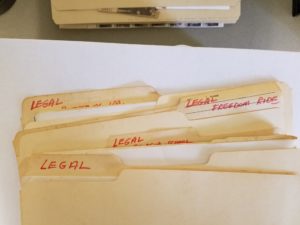(Note: This post was authored by Taylor McNeilly, Processing & Reference Archivist.) Hello, and welcome to another #WyattWalkerWednesday post! I’ve been busy processing the Dr. and Mrs. Wyatt Tee Walker Collection, and I’m still in the middle of Dr. Walker’s SCLC records. One of the interesting finds I came upon this week was a group of folders all labeled “LEGAL” that seem to touch on a variety of topics.
As you can see in the above photo, the folders aren’t labeled just LEGAL (except for a few that are). Most of them have clarifying details, which are where things get really interesting. Perhaps most notable for researchers is the folder labeled “LEGAL FREEDOM RIDE.” And while these documents will certainly be interesting, my interest was particularly focused on the back folder. Perhaps not visible enough to be legible in the photo, that folder’s label reads “LEGAL Petersburg VA.”
We have very little material from Dr. Walker’s time in Petersburg. The collection was donated beginning in 2015, and by then Dr. and Mrs. Walker had been away from Petersburg for over 50 years, so it makes sense that the amount of material they had kept from that time would be less than from more recent work, especially their work in Harlem. Nonetheless, anytime material connected to Dr. Walker’s time in Petersburg and Richmond comes up, I’m especially excited!
The Petersburg legal folder contained three documents, each stapled. These appear to be copies of lawsuits and supplementary information filed with the suits, all of them in the East District or Richmond District of Virginia. The suits appear to be focused on the integration of bus stop lunch counters in Petersburg, which was the first civil rights work that Dr. Walker worked on – just before his work on integrating the public library in Petersburg. We have some records pertaining to his work on the library, but so far had found nothing about the bus stop lunch counters. This materials in this folder, then, play an exciting role in filling a hole in the collection’s historical record, documenting some of the first civil rights work Dr. Walker did during his time in Petersburg.
It’s important to note that the folders pictured above will not be making it into the collection, even though the material held inside them will be. A major part of processing a collection is rehousing the materials in archival quality folders and boxes. This helps preserve the material, extending its lifespan to ensure its availability for generations to come. Once the collection opens, the materials themselves will still be accessible, so don’t worry!

